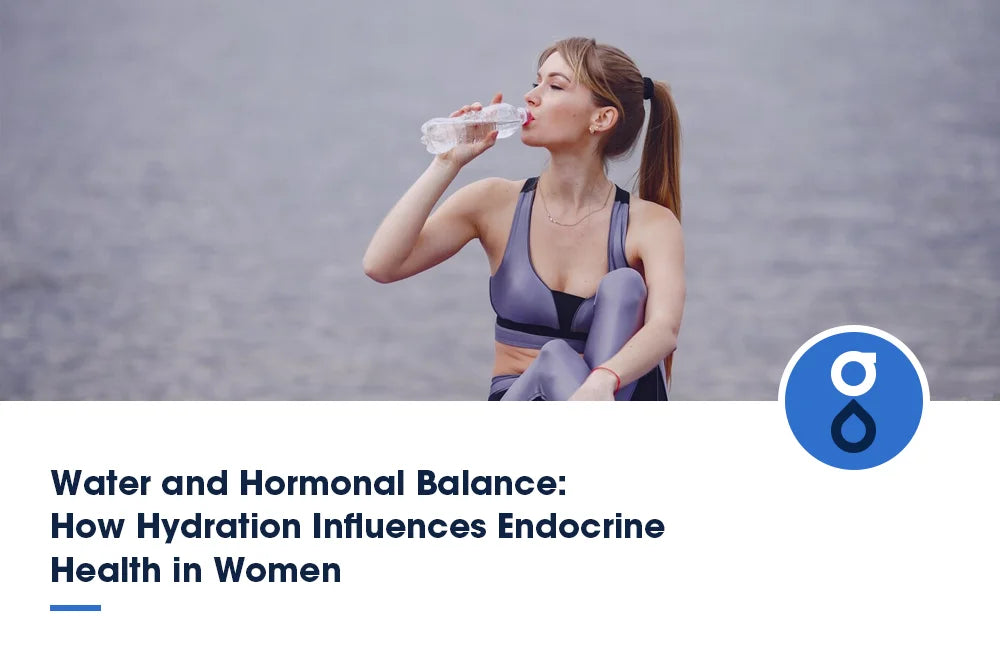Table of Contents:
The importance of hormonal balance in women
The role of water in hormonal balance
What`s the link between hydration and endocrine health in women?
Observational studies on water intake and hormonal imbalances
Strategies to maintain optimal hydration and hormonal balance
FAQs
Conclusion
Water is the essence of life, and its significance goes far beyond quenching our thirst. Adequate hydration is crucial in maintaining overall well-being and is particularly essential for hormonal balance in women. Hormones are chemical messengers secreted by the endocrine glands that regulate various bodily functions, including reproduction, metabolism, mood, and sleep. Any disruption in hormonal balance can lead to a range of health issues. In this article, we will explore the connection between water and hormonal balance and understand how proper hydration can positively influence endocrine health in women.
The importance of hormonal balance in women
Understanding endocrine health
To maintain overall well-being, women must understand the significance of hormonal balance in their endocrine health. Hormonal regulation plays a vital role in ensuring that the body's endocrine system functions optimally. This system regulates hormone production, influencing various bodily functions and processes.
Hormones act as chemical messengers in the body, controlling metabolism, growth, mood, and reproductive processes. Women experience improved energy levels, mood stability, and overall health when hormone levels are balanced. However, hormonal disorders can disrupt this delicate balance, leading to a wide range of health issues. Imbalances in hormone levels can result in conditions such as polycystic ovary syndrome (PCOS), thyroid disorders, and menstrual irregularities.
Common hormonal imbalances in women
Understanding the importance of hormonal balance in women, one must be aware of the common hormonal imbalances that can impact their overall health. Here are some key hormonal imbalances that women may experience:
- Menstrual irregularities: Hormonal regulation plays a crucial role in the menstrual cycle. Imbalances in estrogen and progesterone levels can lead to irregular periods, heavy bleeding, or even missed periods. These irregularities can affect fertility and overall reproductive health.
- Thyroid dysfunction: The thyroid gland plays a vital role in hormone regulation. Conditions like hypothyroidism or hyperthyroidism can disrupt the balance of hormones in the body, leading to symptoms such as weight changes, fatigue, and mood swings.
- Polycystic ovary syndrome (PCOS): PCOS is a common hormonal disorder among women of reproductive age. It's characterized by hormonal imbalances that can lead to irregular periods, ovarian cysts, acne, and excessive hair growth. Proper diagnosis and treatment are essential to manage symptoms and prevent long-term complications.
Understanding these common hormonal imbalances can help women recognize potential issues early and seek appropriate medical guidance, including hormone replacement therapy when necessary.
The role of water in hormonal balance
The significance of hydration for hormonal health
Adequate hydration plays a crucial role in maintaining hormonal balance in women. When you ensure proper hydration levels, you support the intricate mechanisms of hormone regulation within your endocrine system, which is vital for overall female health. Here's why staying hydrated is essential for hormonal well-being:
- Optimal hormone production: Adequate water consumption is necessary for the production and secretion of hormones by the endocrine glands. Without enough water, these glands may not function efficiently, potentially leading to imbalances in estrogen, progesterone, and other crucial hormones.
- Transport of hormones: Water acts as a carrier, facilitating the transportation of hormones throughout your body. Proper hydration ensures that hormones reach their target tissues effectively, allowing them to exert their regulatory effects as intended.
- Detoxification: Water is key in eliminating metabolic waste and toxins from the body, including excess hormones. Staying hydrated supports the detoxification processes that help maintain hormonal balance and overall health.
Effects of dehydration on hormonal function
Regularly failing to maintain proper hydration levels can significantly disrupt your body's delicate balance of hormones. The consequences of dehydration can lead to a cascade of effects on hormonal function.
Hormonal regulation is intricately tied to hydration, and dehydration can impair this balance, impacting endocrine health. When your body lacks sufficient water intake, the production and release of hormones may be compromised, affecting various physiological processes.
The connection between endocrine health and hydration is vital, with mild dehydration potentially influencing hormonal balance. Adequate hydration is essential for supporting optimal hormonal function, as water plays a crucial role in transporting and signaling hormones throughout the body.
What`s the link between hydration and endocrine health in women?

Maintaining proper hydration levels is crucial for supporting optimal endocrine health in women. When it comes to the link between hydration and the endocrine system, here are three key points to consider:
- Hormonal regulation: Adequate water intake is essential for the proper functioning of hormonal regulation in women. Dehydration can disrupt the delicate balance of hormones in the body, impacting menstrual cycles, fertility, and overall endocrine health.
- Endocrine system function: The endocrine system, responsible for producing hormones that regulate various bodily functions, relies on sufficient hydration to operate efficiently. Dehydration can hinder the endocrine glands' ability to release hormones, leading to potential imbalances and health issues.
- Women's health: Hydration plays a significant role in women's health, especially concerning the endocrine system. Proper water intake supports hormone production, helps maintain menstrual regularity, and aids in overall well-being.
Neglecting hydration can have adverse effects on women's hormonal balance and endocrine function, emphasizing the importance of staying adequately hydrated for optimal health.
Observational studies on water intake and hormonal imbalances

In observational studies examining water intake and hormonal imbalances, researchers have found compelling correlations between hydration levels and disruptions in hormone regulation in women. Studies have shown that inadequate water consumption can lead to imbalances in hormone regulation within the endocrine system, affecting various aspects of women's health.
Research findings suggest that dehydration can impact the production and release of cortisol, insulin, and thyroid hormones, which play crucial roles in metabolism, stress response, and energy regulation. Moreover, fluctuations in hydration levels have been linked to menstrual irregularities and reproductive hormone imbalances in women. These studies highlight the importance of maintaining optimal hydration levels to support proper hormone regulation and overall endocrine health.
Strategies to maintain optimal hydration and hormonal balance
Tips for adequate water intake
To ensure optimal hydration and hormonal balance, it's essential to incorporate effective strategies for adequate water intake into your daily routine. Here are some tips to help you maintain proper hydration levels and support your endocrine health:
- Hydration Guidelines: Aim to drink at least 8-10 cups of water per day, but individual needs may vary based on factors like activity level and climate.
- Water Benefits: Water plays a crucial role in hormone regulation, nutrient transport, and waste removal in the body. Staying hydrated can help support overall hormonal balance.
- Drinking Habits: Develop a habit of carrying a reusable water bottle with you throughout the day to make it easier to stay hydrated. Set reminders on your phone or establish specific times to drink water to ensure you're meeting your fluid intake goals.
Hydrating foods and beverages for women
Incorporate hydrating foods and beverages into your diet to support optimal hydration and hormonal balance. Start your day with hydrating smoothies packed with water-rich fruits like watermelon and cucumber. Herbal infusions like chamomile or ginger tea can also increase your daily fluid intake—snack on water-rich veggies such as celery or bell peppers to stay hydrated throughout the day.
Drinks like coconut water or electrolyte-enhanced beverages should be considered to replenish essential minerals lost through sweat for added electrolytes. Soups, especially broths with vegetables, are hydrating and provide nourishment and warmth. Hydration tips and tricks include:
- Carrying a reusable water bottle with you wherever you go.
- Infusing your water with fruits or herbs for added flavor.
- Setting reminders to drink water regularly throughout the day.
Lifestyle factors that influence hydration
Start by evaluating your daily routines and habits to identify lifestyle factors that may be impacting your hydration levels and hormonal balance. To ensure optimal hydration and hormonal health, consider the following:
- Hydration Habits: Pay attention to how often you drink water throughout the day. Set reminders or carry a water bottle to encourage regular hydration.
- Water Sources: Be mindful of where your water is coming from. Opt for clean, filtered water to avoid potential contaminants that could disrupt your hormonal balance.
- Fluid Intake: Keep track of your overall fluid intake, including water and other hydrating beverages like herbal teas or infused water. Adequate fluid intake is vital for maintaining proper hydration levels and supporting hormonal function.
The role of fluid balance in achieving hormonal health
Maintaining a harmonious fluid balance is crucial for nurturing optimal hormonal health and well-being. Hormonal regulation, a vital aspect of the endocrine system in women's health, relies heavily on adequate hydration levels and proper fluid balance.
When dehydrated, your body may struggle to produce and regulate hormones effectively, leading to potential imbalances that can impact various bodily functions. To support your endocrine system and promote hormonal balance, it's essential to prioritize staying hydrated throughout the day.
Maintaining optimal hydration includes drinking adequate water daily, being mindful of your fluid intake, and listening to your body's thirst cues. Additionally, consuming hydrating foods such as fruits and vegetables can contribute to your overall fluid balance.
FAQs
What role do exercise and sleep play in hormonal balance?
Remember the importance of exercise and quality sleep in your routine to maintain hormonal balance. Exercise benefits hormone regulation, while good sleep supports hormone production. Ensure hydration levels are adequate for optimal endocrine health.
Are there specific foods that can help regulate hormones?
To regulate hormones, focus on a nutrient-rich diet with hormone-balancing foods. Consider herbal supplements and the effects of hydration on hormone balance. Lifestyle changes like stress management and regular exercise can also help maintain hormonal health.
Conclusion
In conclusion, staying properly hydrated is crucial for maintaining hormonal balance and supporting overall endocrine health in women. Drinking enough water and incorporating hydrating foods into your diet can help regulate hormone production, transport, and detoxification processes. Prioritizing hydration can lead to improved mood, energy levels, and overall well-being. So, remember to drink up and care for your endocrine system for optimal health.



















